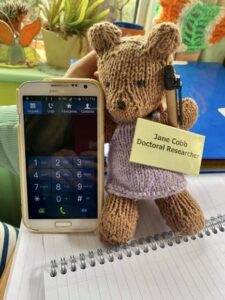
I recently practised a presentation in front of my daughter; I’d asked her to say what she thought. She commented: “I think you should begin by explaining what you are doing.” I replied abruptly that no, I wanted this to emerge as I talked.
“It’s confusing.”
“I don’t think so.”
“Well, if you’re not going to take any notice of what I think, I’m going.” She went.
The boundary between defending my ideas and taking on board constructive criticism constructively is one I have needed to learn to identify along my research journey. I recognise a similar uncertainty between defending and being defensive amongst some students as I provide feedback on their assessed writing.
A particular student on a first-level English language module was doing very well, gaining distinctions for almost all assignments, but they questioned most of the minimal (in my view) criticisms within my written feedback. I realised their persistent questioning resulted from an assumption that I had misunderstood their intentions; therefore, they felt they needed to explain their rationale whilst not contesting my grading of their finished assignment. Their questioning was the result of a concern for mutual understanding; yet, for a student achieving consistently in the nineties, this could be seen as defensive.
I consider that this need to explain, to discuss, and for dialogue with an assessor/evaluator/supervisor/mentor is crucial in our feedback processes at all academic levels. As tutors, I think that we need to recognise the inherent power of our evaluative comments. Criticism – especially that which is not mitigated by dialogue – was shown to have a powerful impact amongst students in my research into multiple viewpoints around feedback practices, with one tutor commenting that a lot of students “see the feedback as a list of errors”. Young (2010), researching self-esteem and mature students’ feelings on assignment feedback, reports that feedback comments affected some students’ “whole sense of self” (page 409). Young’s article is entitled aptly, “I Might as Well Give Up”.
However, a student, too, can be viewed as having inherent power within a different feedback context, such as when completing formal evaluations of their tutor’s practice. Macfadyen et al. (2016:821), in their multi-level analysis of the evaluation of teaching by students, note the extent of the rapid “emotional debate” that student evaluation evokes. Indeed, an experienced tutor in my research commented that a student’s criticism of their tutoring “sticks in your mind…and you can’t get rid of”. No talkback no dialogue, means the opportunity for both defending and mutual understanding is lost, and the negativity “sticks”.
Therefore, in attempting to identify a boundary between defending my own work and being defensive, my emerging recommendations to myself are twofold. Firstly, allow time to digest evaluative comments, re-read, and attempt to understand where the other is coming from. Secondly, take any opportunity to engage in dialogue with the other – via whatever medium is available – to continually strive towards mutual understanding.
My daughter was right about my presentation. My way was confusing. I had not taken time to listen to the listener, my audience, to acknowledge their opinion and allow it to negotiate with my own. If I had, I might have had the opportunity for an ongoing dialogue to defend my own rationale whilst not shutting out defensively the view of the other.
This value of the joint construction of meaning is explained by Halasek (1999) in her book, A Pedagogy of Possibility. Halasek presents a perspective on composition studies which adopts Bakhtin’s concept of the dialogic, seeing the relationship between participants in an evaluative process as a constant search for meaning. Halasek echoes Bakhtin’s emphasis on the importance of the audience, that “through the discourse, the audience constructs the author” (page 62).
However, that opportunity to think then respond, question, and discuss is sometimes unavailable – perhaps following a final, summative assessment, feedback on an article submitted for publication or a formal complaint or evaluation, as in the example above. In such cases, when an opportunity for dialogue with the evaluator who possesses inherent power is shut off, how is the boundary between being defensive and defending our work and ideas to be navigated? Young (see above) finds that variations in reactions to tutor feedback are linked to self-esteem. So, is acknowledgement and moving forward – despite the inevitability of undefended, one-way criticism – perhaps what we mean by having academic confidence?
 I have been an Associate Lecturer at the Open University since 2002, tutoring mainly English language modules. I live in Stourbridge in the West Midlands with my husband, two adult children and three Romanian rescue (street) dogs. My recent EdD and my current research interests concern the multiple perspectives around feedback practices around assessed writing in HE. This is my first venture into blogging, and I am looking forward to this creative space, where colleagues can share, debate, and discuss issues arising around their research.
I have been an Associate Lecturer at the Open University since 2002, tutoring mainly English language modules. I live in Stourbridge in the West Midlands with my husband, two adult children and three Romanian rescue (street) dogs. My recent EdD and my current research interests concern the multiple perspectives around feedback practices around assessed writing in HE. This is my first venture into blogging, and I am looking forward to this creative space, where colleagues can share, debate, and discuss issues arising around their research.

 In considering which perspectives were essential to explore to understand feedback practices within this context, three distinct participant groups emerged clearly in terms of their allocated roles within the feedback process. These comprised those who study and pay for tuition (students), those who facilitate and deliver a pedagogical service by working directly with students (tutors) and those who design and write the module and monitor the process of its delivery and assessment, manage staff and appoint tutors (central academics).
In considering which perspectives were essential to explore to understand feedback practices within this context, three distinct participant groups emerged clearly in terms of their allocated roles within the feedback process. These comprised those who study and pay for tuition (students), those who facilitate and deliver a pedagogical service by working directly with students (tutors) and those who design and write the module and monitor the process of its delivery and assessment, manage staff and appoint tutors (central academics).